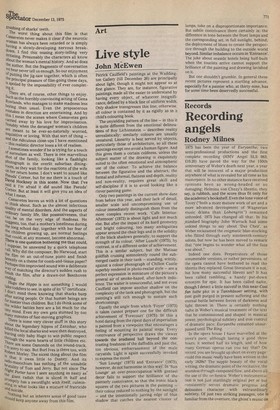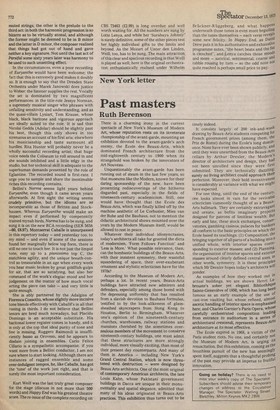Records
Recording angels
Rodney Mines
1975 has been the year of Euryanthe; two semi-professional productions and the first complete recording (HMV Angel SLS 983, £10.20) have paved the way for the 150th anniversary of Weber's death next year, a year that will be innocent of a major production anywhere of what is revealed for all time as his masterpiece. In no other instance have received opinions been so wrong-headed or so damaging; Helmina von Chezy's libretto, they say, is rubbish, and the score thus fit only for the academic's bookshelf. Even the lone voice of Tovey ("both a more mature work of art and a more advanced development of Wagnerian music drama than Lohengrin") remained unheeded. 1975 has changed all that. In his ,standard biography John Warrack had some unkind things to say about 'Das Chez', as Weber nicknamed the enigmatic blue-stocking who flitted through early nineteenth-century salons, but now he has been moved to remark that "one begins to wonder what all the fuss was about."
Indeed one does. Perpetrators of those innumerable versions, or rather perversions, of the opera cannot have bothered to read the libretto they replaced. Great literature it is not, but how many successful libretti are? It has been called rambling, a handy put-down synonym for epic. It has been called naiVe, though I detect a little naivet6 in this near-Cosi fan tutte plot in a Tannhauser setting, with past guilt purged in present suffering and the eternal battle between forces of darkness and light thrown in. There is certainly nothing nalVe in Weber's musical treatment of the text that he commissioned and shaped: in musical power, psychological subtlety and iron control of dramatic pace, Euryanthe remained unsurpassed until The Ring.
In the opera house I have marvelled at the piece's pace; although lasting a good three hours, it seemed half its length, and of how many German operas can you say that? On record, you are brought up short on every page: could this music really have been written in the early 1820s? The supple beauty of the vocal writing, the dramatic point of the recitative, the seamless through-composed flow, and above all the use of the orchestra: Weber's instrumentation is not just startlingly original per se but consistently serves dramatic progress and delineates character with extraordinary subtlety. Of just two striking passages, one is familiar from the overture, the ghost's music on muted strings; the other is the prelude to the third act: in both the harmonic progression is so bizarre as to be virtually atonal, and although the former might be deemed to be in B minor and the latter in D minor, the composer realised that things had got out of hand and gave neither a key signature. Not until the last act of Parsifal some sixty years later was harmony to be used to such unsettling effect.
In the circumstances, even a poor recording of Euryanthe would have been welcome; the fact that this is extremely good makes it doubly so. It is enough to say that the Dresden State Orchestra under Marek Janowski does justice to Weber: the listener supplies the rest. Vocally the set is dominated by two magnificent performances: in the title-role Jessye Norman, a supremely musical singer who phrases with unfailing sensitivity and understanding, and as the quasi-villain Lysiart, Tom Krause, whose black, black baritone and vigorous approach are ideally suited to the role. It is sad that Nicolai Gedda (Adolar) should be slightly past his best, though this only shows in too strenuous an account of his first aria; elsewhere his musicianship and taste surmount all hurdles. Rita Hunter will probably never be a wholly successful recording artist; that huge voice needs the Coliseum to roll around in and she sounds inhibited and a little edgy in the studio, but her technical skill is adequate to the superhuman demands presented by the role of Eglantine. The recorded sound is first-rate. I urge you to sample and share the inestimable riches this recording contains.
Bellini's Norma seems light years behind Euryanthe, even though it came seven years afterwards. At first sight the writing seems crudely primitive, but the idioms are as incomparable as those of Britten and Stockhausen. Whereas Euryanthe would make an impact even if performed by competently trained mynah birds, Norma has to be sung, and sung it is on the new RCA recording (SER 5658 —60, B.97). Montserrat Cabslle is unsurpassed in this repertory today — and yesterday too, to my mind — and even if some of the sessions found her marginally below top form, there is still no one to touch her. It is not just the limpid tone, easy up to a pianissimo top C, the matchless agility, and the unique breath-control so treasurable in an age when every week you hear music broken by great goldfish-gulps for air, that are so satisfying, but also her command of the work's elegiac mood and her judgement on the matter of how much vocal acting the piece can take — and very little is quite enough.
She is ably partnered by the Adalgisa of Fiorenca Cossotto, whose slightly more incisive tone blends effectively with Cabal l's in all that cooing in thirds. I do not believe that Bellini tenors are bred much nowadays, but Placido Domingo is an acceptable substitute. His baritonal lower register comes in handy, and it is only at the top that ideal purity of tone and line is missing. Ruggero Raimondi is insufficiently basso as Oroveso, and he appears to disdain joining in ensembles. Carlo Felice Cillario is a sympathetic accompanist: if you want more from a Bellini conductor, I am not sure where to start looking. Although there are instances of ragged ensemble and some over-indulgent tempos, he, like Caballe, has got the lone' of the work just right, and that is surely the most important consideration.
Kurt Weill was the last truly great composer for the stage (discuss in not more than 500 words) and Happy End was his greatest theatre score. The re-issue of the complete recording on CBS 73463 (£2.99) is long overdue and well worth waiting for. All the numbers are sung by Lotte Lenya, and while her `Surabaya Johnny' is surely definitive, some of the other pieces test her highly individual gifts to the limits and beyond. As the Mozart of Unter den Linden, Weill, too, has to be sung. The main attraction, of this clear and spacious recording is that Weill is played as well; here is the original orchestration enthusiastically realised under Wilhelm
Briickner-Ruggeberg, and what haPPens underneath those tunes is even more beguiling than the tunes themselves — each verse reveals some new felicity. In Happy End, as David Drew puts it in his authoritative and exhaustive programme notes, "the heart beats and the fist is clenched", and Lenya catches those moods and more — satirical, sentimental, coarse and rabble rousing by turn — so the odd note not quite reached is perhaps small price to pay.


































 Previous page
Previous page